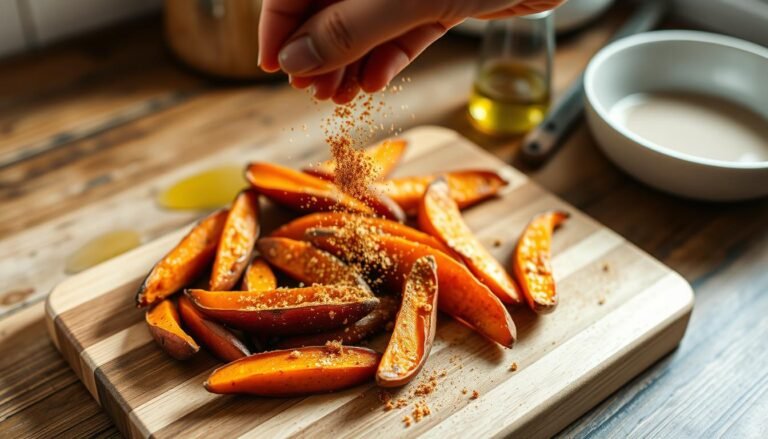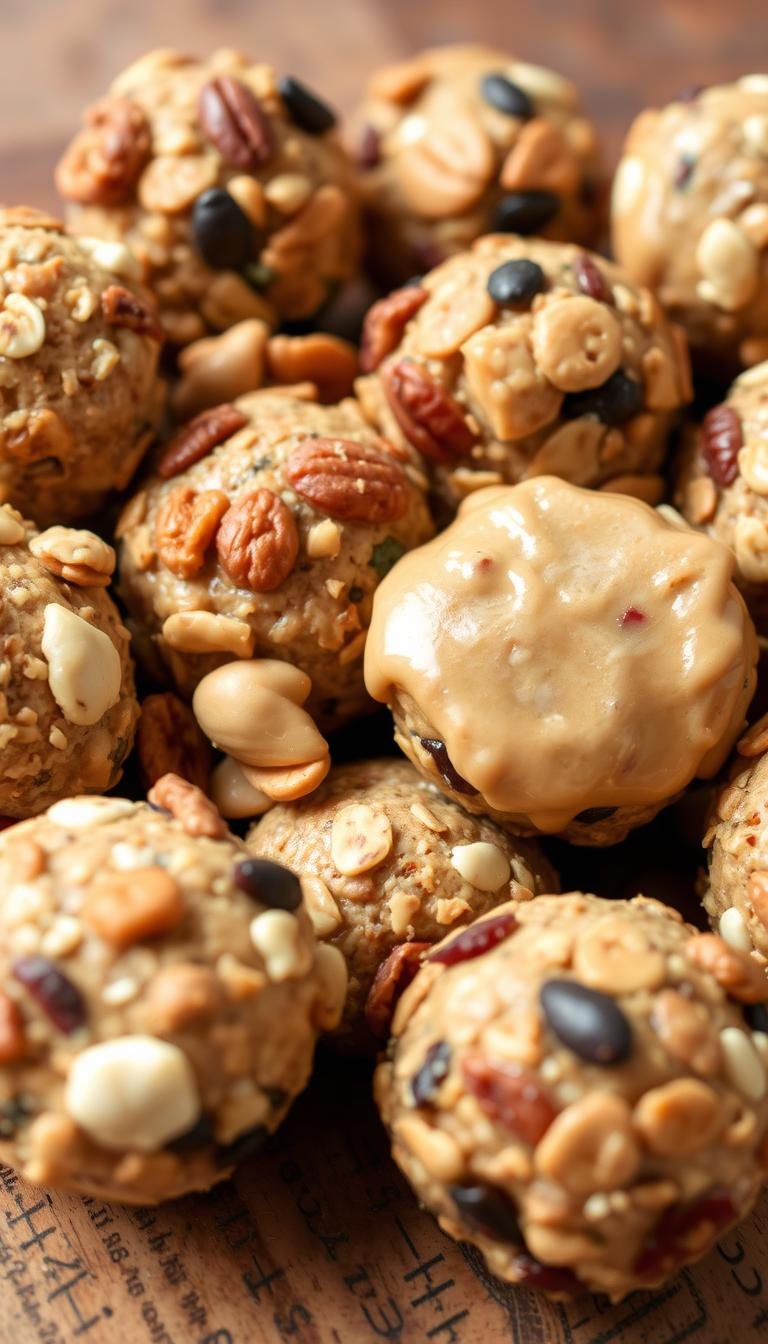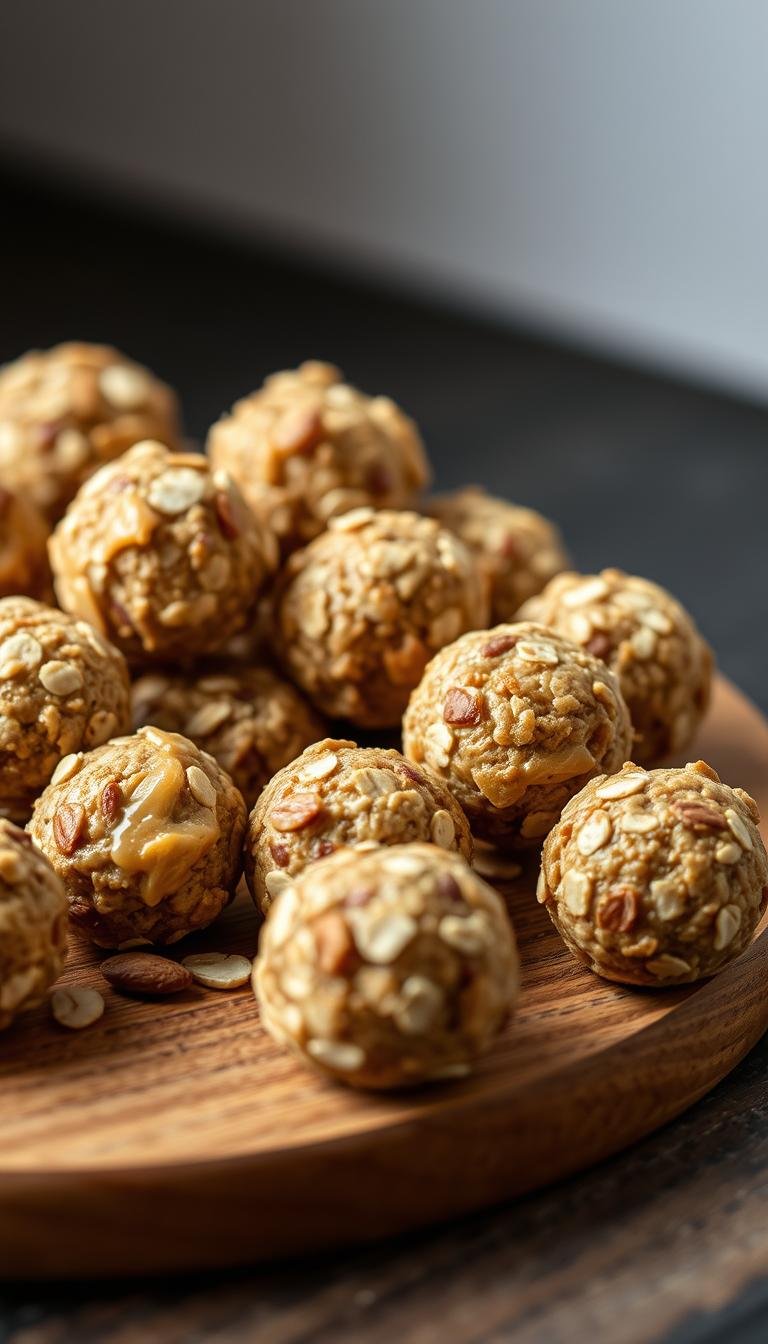Wild Rice & Mushroom Pilaf
Welcome to one of my absolute favorite comfort food recipes! This dish combines nutty grains with the earthy richness of fresh fungi. I’m excited to share it with you because it’s a staple in my kitchen.
This dish is perfect for cozy family dinners and holiday gatherings. It’s both rustic and elegant. Cooking it fills your kitchen with amazing aromas.
This recipe stands out among my wild rice recipes because the grains stay chewy. They soak up all the flavors beautifully! This mushroom pilaf always delivers satisfying results.
Get ready for a side dish that will become your new favorite. The mix of textures and tastes is truly special!
What Makes Wild Rice & Mushroom Pilaf Special
Wild Rice & Mushroom Pilaf is truly magical. It combines nature’s best in a delicious meal. Once you know its secrets, you’ll want it on your dinner table all the time!
Understanding Wild Rice
Wild rice isn’t actually rice. It’s a grass seed native to North America loved by indigenous communities for centuries. Its nutty flavor is unlike regular rice.
Wild rice’s texture is amazing. It has a chewy bite that makes every bite special. Cooking it takes longer, but it’s worth the wait!
Its dark color adds elegance to any dish. Wild rice is a healthy grain that’s both beautiful and tasty.
The Perfect Mushroom Pairing
Wild rice and mushrooms are a perfect match. Mushrooms add a rich, earthy umami flavor that complements wild rice’s nuttiness. It’s a match made in heaven!
Sautéed mushrooms release their moisture, intensifying their flavors. They create a delicious base for the pilaf. Their tender texture contrasts beautifully with wild rice’s chewiness.
Different mushrooms add unique qualities to the dish. Some are meaty, others sweet. They all contribute to the dish’s amazing flavor.
Nutritional Benefits
Wild rice is a nutritional powerhouse. It’s full of protein, fiber, and minerals like manganese and phosphorus. It makes you feel full and energized.
Mushrooms add even more nutrients with their B vitamins and antioxidants. Together, they make a dish that’s not just tasty but also healthy for you and your family.
Cooking wild rice in this pilaf gives you a complete meal. It’s comfort food that loves you back. What’s better than that?
Essential Ingredients for Perfect Results
Quality ingredients are key to making the perfect wild rice and mushroom pilaf! I’ve learned that starting with the right ingredients is essential. Let me show you what you need to make this amazing dish.
Choosing the Right Wild Rice
When buying wild rice, look for hand-harvested varieties. They have the best taste and texture! You can find wild rice in most grocery stores, in the rice or health food aisle.
It might seem expensive compared to regular rice. But a little wild rice goes a long way. I use about one cup for four to six people.
Choose grains that are long, dark, and uniform in size. Avoid broken pieces or debris. The best wild rice smells rich and nutty even before cooking!
Best Mushroom Varieties
Now, let’s talk about the magic! I love using a mix of mushrooms for amazing flavor. Cremini and shiitake mushrooms are my favorites.
Cremini mushrooms have a classic earthy taste. Shiitake mushrooms add a meaty texture and rich umami flavor. Together, they make the dish irresistible!
| Mushroom Type | Flavor Profile | Texture | Best Use |
|---|---|---|---|
| Cremini | Earthy, mild | Firm, tender | Base flavor |
| Shiitake | Rich, umami | Meaty, substantial | Depth enhancement |
| Button | Mild, clean | Soft, delicate | Budget-friendly option |
| Portobello | Intense, smoky | Dense, chewy | Hearty variation |
Supporting Ingredients and Seasonings
Your supporting ingredients are just as important. You’ll need good vegetable or chicken broth. I prefer low-sodium for perfect salt control.
For flavor, grab a yellow onion and fresh garlic. They create the base flavor that makes everything come together beautifully!
Don’t forget the herbs and seasonings! Fresh thyme and bay leaves are essential. A splash of dry white wine adds incredible depth to your pilaf.
These simple ingredients create layers of flavor that make wild rice special. Trust me, the difference quality ingredients make is worth it!
Kitchen Tools and Equipment Needed
Let’s talk about the kitchen essentials for making pilaf. You don’t need fancy gadgets or expensive equipment. Most home cooks already have what they need to make amazing grain dishes in their kitchen.
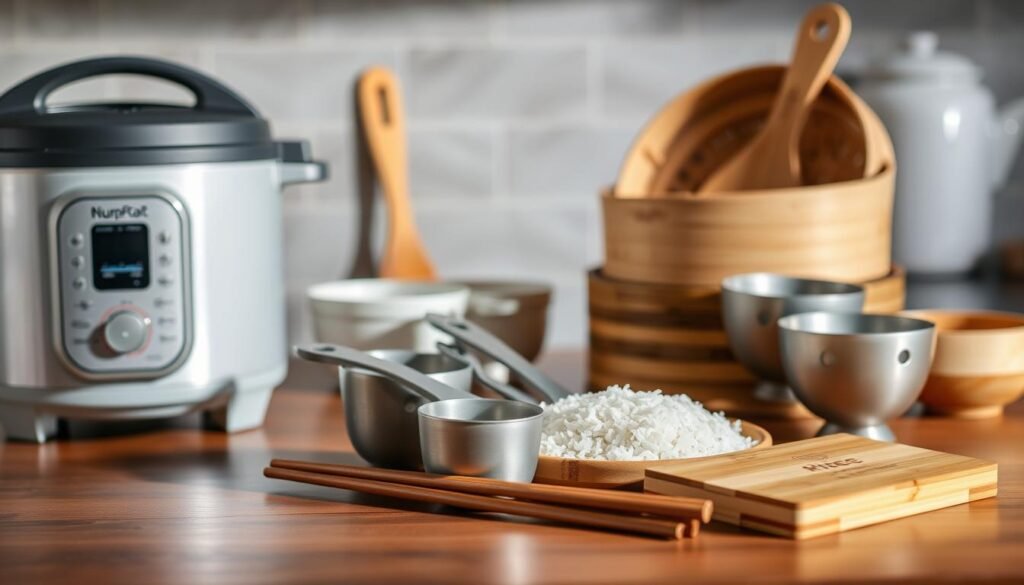
Essential Cookware
Your most important piece of equipment is a heavy-bottomed saucepan or Dutch oven with a tight-fitting lid. I love using my 3-quart saucepan for this recipe. It’s the perfect size and prevents hot spots that can burn your rice.
You’ll also need a large skillet for sautéing your mushrooms. This step is key for deep, rich flavors. A 10 or 12-inch skillet is perfect and gives your mushrooms room to brown beautifully.
- 3-quart heavy-bottomed saucepan with tight-fitting lid
- Large skillet (10-12 inches) for mushroom sautéing
- Dutch oven as an alternative to saucepan
Helpful Utensils
Keep your utensil collection simple and effective! A wooden spoon is my go-to for stirring. It won’t scratch your cookware and feels great in your hand. You’ll definitely need a fine-mesh strainer for rinsing the wild rice thoroughly.
Don’t forget about prep work! A sharp knife makes chopping vegetables a breeze. Measuring cups and spoons ensure perfect proportions every time. A kitchen timer is super helpful for tracking cooking times during rice preparation.
- Wooden spoon for gentle stirring
- Fine-mesh strainer for rinsing rice
- Sharp chef’s knife for vegetable prep
- Measuring cups and spoons for accuracy
- Kitchen timer for perfect timing
The beauty of this recipe is its simplicity. No special equipment is needed! These basic tools will help you create restaurant-quality results right at home.
Preparing Your Ingredients
Getting your ingredients ready is key to a great wild rice and mushroom pilaf! This meal prep step is simple but vital. When everything is prepped, cooking becomes easy and fun.
Good preparation sets great cooks apart. Just 10-15 minutes of prep can make your pilaf perfect every time!
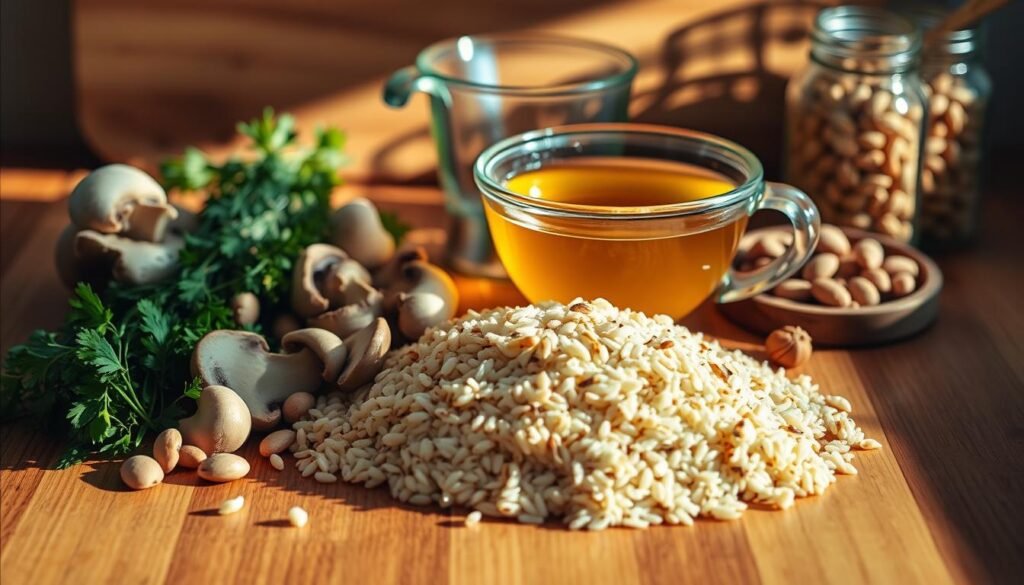
Cleaning and Rinsing Wild Rice
Rinsing your wild rice is so important! Rinse it in a fine-mesh strainer with cold water until the water is clear.
Swish the rice with your hands while rinsing. This removes debris and excess starch, preventing a gummy pilaf. Don’t skip this step – it’s a game-changer!
Preparing Mushrooms
Never soak mushrooms in water! They’ll get too wet. Instead, gently wipe them with a damp paper towel to clean them.
Slice mushrooms into 1/4-inch thick pieces. This ensures they cook evenly and look great in your pilaf. Consistent sizing is key for a professional look!
Chopping Aromatics
Your aromatics are the flavor foundation. Dice your onion finely for even cooking and blending.
Mince your garlic finely too. If using fresh thyme, strip the leaves from stems. Have your bay leaves ready to add when needed.
This prep work turns simple ingredients into a satisfying side dish. Trust me, the taste will be worth the effort!
Step-by-Step Wild Rice & Mushroom Pilaf Recipe
It’s time to turn those prepped ingredients into a tasty wild rice and mushroom pilaf! This traditional pilaf cooking method brings out amazing flavors. Your kitchen will smell incredible. We’ll go through each step together, and you’ll see how easy and impressive it is!
The magic of these cooking techniques is in building flavors slowly. Each step adds to the dish’s deliciousness. Let’s start cooking!
Toasting the Wild Rice
First, heat a large, dry skillet over medium heat. Add your rinsed and drained wild rice to the pan. This is where the magic begins!
Toast the rice for 3-4 minutes, stirring often with a wooden spoon. You’ll hear the grains popping and crackling. This is what we want! The rice will smell nutty, setting the flavor for our pilaf.
Don’t rush this step. Toasting is key for deep, complex flavors in your pilaf.
Sautéing Mushrooms and Aromatics
Heat 2 tablespoons of olive oil or butter in your skillet over medium-high heat. Add the sliced mushrooms in a single layer – don’t overcrowd them!
Cook the mushrooms for 4-5 minutes without stirring. This lets them get golden brown. Then stir and cook for another 2-3 minutes until they release their moisture.
Push the mushrooms to one side of the pan. Add the diced onions and minced garlic to the empty space. Cook for 2-3 minutes until the onions are translucent and fragrant.
Combining and Simmering
Now, the exciting part of our pilaf cooking method! Move the toasted wild rice to a heavy-bottomed saucepan. Add the sautéed mushroom mixture and stir everything together.
Pour in 3 cups of warm vegetable or chicken broth. Add your bay leaves, thyme, salt, and pepper. Bring the mixture to a rolling boil over high heat.
Once boiling, immediately reduce the heat to low. Cover the pan with a tight-fitting lid and let it simmer gently. This gentle simmering is key for perfectly cooked wild rice!
Final Cooking and Resting
Let your pilaf simmer covered for 45-50 minutes. Resist the urge to lift the lid! This steaming process is essential for tender, fluffy rice.
After cooking, remove the pan from heat but keep it covered. Let it rest for 10 minutes – this final step is critical!
During this resting period, the rice absorbs any remaining liquid and the grains separate beautifully. Remove the bay leaves and fluff gently with a fork before serving.
| Cooking Stage | Temperature | Time | Key Indicator |
|---|---|---|---|
| Toasting Rice | Medium Heat | 3-4 minutes | Popping sounds, nutty aroma |
| Sautéing Mushrooms | Medium-High Heat | 6-8 minutes | Golden brown color |
| Simmering Pilaf | Low Heat | 45-50 minutes | Gentle bubbling |
| Resting Period | Off Heat | 10 minutes | Steam absorption |
These proven cooking techniques guarantee your wild rice pilaf turns out perfectly every time. The combination of toasting, sautéing, and gentle simmering creates incredible depth of flavor. It will impress everyone at your table!
Expert Tips for Perfect Results
Want to make wild rice pilaf like a pro? Follow these cooking tips for recipe success every time. I’ve perfected these methods over the years.
Wild rice is different from regular rice. It needs more time, liquid, and care. But with these tips, you’ll make perfect pilaf every time!
Achieving the Right Texture
For the perfect texture, use a 3:1 ratio of liquid to wild rice. This keeps it moist without being soggy.
Don’t lift the lid too often! It releases steam, which is key for cooking wild rice right.
If your pilaf is dry, add warm broth slowly. Wait 5 minutes between each addition. This keeps it moist and prevents overcooking.
Flavor Enhancement Techniques
Want to make your pilaf amazing? Try these flavor-boosting cooking tips used by chefs!
Use white wine when sautéing aromatics. It adds deep, complex flavors that make your pilaf taste gourmet.
Stir in butter and fresh herbs before serving. This adds luxurious richness and bright, fresh notes.
Toasting wild rice before cooking adds a nutty flavor. It’s a simple step that makes a big difference.
Common Mistakes to Avoid
Knowing what not to do is key for recipe success. Avoid these common mistakes to prevent ruining your pilaf!
| Common Mistake | Why It Happens | Easy Fix | Result |
|---|---|---|---|
| Skipping rice toasting | Seems like extra work | Toast 2-3 minutes until fragrant | Better nutty flavor |
| Rushing mushroom sauté | Impatience with timing | Cook until golden brown | Deeper mushroom taste |
| Over-stirring during cooking | Checking progress too often | Stir only when adding ingredients | Perfect texture maintained |
| Wrong liquid ratio | Treating like regular rice | Use 3:1 liquid to rice ratio | Properly cooked grains |
Don’t rush the mushroom sautéing. Let them get golden brown for rich flavors.
Lastly, avoid over-stirring during simmering. Wild rice is sturdy, but gentle handling keeps it from getting mushy. Stir only when necessary, and use a light touch!
Delicious Variations and Add-ins
Turn your basic pilaf into something amazing with these recipe variations! Wild rice and mushroom pilaf is great because it can be so different every time. You can change it up based on what you have or what you’re in the mood for.
I love trying new things with this dish. It’s one of those customizable recipes that never gets old. You can make it more filling with protein, colorful with veggies, or aromatic with herbs and spices. The choices are endless!
Protein Additions
Adding protein makes this side dish a full meal! Cooked chicken or turkey is a great choice – just add it in the last few minutes. Leftover roast beef or pork also adds richness and is perfect for using up holiday leftovers.
For a vegetarian protein boost, try adding toasted nuts like pecans, walnuts, or pine nuts. Add them at the end to keep their crunch. Cooked beans or lentils also add fiber and make the dish heartier.
Vegetable Variations
Vegetables bring color, nutrition, and new flavors! Diced carrots and celery are classics – sauté them with the onions. They add sweetness and crunch.
Roasted veggies are great too. Try adding roasted butternut squash, Brussels sprouts, or sweet potatoes at the end. Their caramelized flavors pair well with the mushrooms and wild rice.
For sweetness, dried cranberries or chopped apples are perfect. They contrast nicely with the savory parts. Fresh or frozen peas add a bright green color!
Herb and Spice Combinations
Fresh sage is amazing with wild rice – it enhances the nutty flavors. Add chopped fresh sage leaves in the last few minutes for the best taste.
A pinch of smoked paprika adds depth and a smoky note that goes well with mushrooms. I also like to try fresh thyme, rosemary, or a bay leaf during cooking.
For a strong mushroom flavor, add rehydrated dried porcini mushrooms with their liquid. This makes the dish even more mushroomy. A splash of white wine or a sprinkle of parmesan cheese at the end also adds complexity!
Serving and Storage Tips
This versatile pilaf is great for many serving suggestions and keeps well for later meals! Knowing how to serve and store it right makes every bite a joy.
Serving Suggestions and Pairings
I love how this pilaf goes well with many proteins! Its rich, nutty taste makes it a great side dish for any main course.
Protein pairings that work beautifully:
- Roasted chicken with herbs
- Grilled salmon or other fish
- Pork tenderloin with garlic
- Beef roast or steak
For vegetarian meals, this pilaf is perfect as the main dish! Pair it with a green salad and crusty bread. It’s a complete meal that everyone will love.
Special occasion garnishes include:
- Fresh chopped parsley or chives
- Toasted pine nuts or almonds
- Dried cranberries for color
- A drizzle of good olive oil
Proper Storage Methods
Proper food storage keeps this pilaf fresh and tasty for days! It’s amazing how well it stays good in the fridge.
Keep your cooled pilaf in an airtight container in the fridge for up to four days. The flavors get even better overnight! Make sure it’s cooled down before refrigerating to avoid moisture.
This pilaf also freezes well for up to three months. Divide it into freezer-safe containers or bags for easy meals. Label them with the date for freshness tracking!
Reheating Instructions
Reheating this pilaf right keeps it tasting fresh! I find the stovetop method best for texture and flavor.
Stovetop reheating method:
- Add pilaf to a saucepan with a splash of broth or water
- Heat gently over medium-low heat
- Stir occasionally until warmed through
For microwave reheating, add one tablespoon of liquid to prevent drying. Heat in 30-second intervals, stirring between each one, until it’s hot enough.
These easy storage and reheating tips ensure you’ll enjoy every last bite of your wild rice and mushroom pilaf!
Conclusion
This wild rice and mushroom pilaf is the ultimate comfort food. It’s hearty, nourishing, and perfect for family dinners. It’s a dish that brings everyone together.
The pilaf is incredibly versatile. You can add your favorite vegetables or try different mushrooms. Every time you make it, you create something special for your loved ones.
The aroma of this pilaf fills your kitchen with amazing smells. The nutty wild rice and earthy mushrooms make a satisfying meal. It’s great for any occasion, from weeknight dinners to holidays.
Feel free to make this recipe your own. Try new herbs, add nuts, or include your favorite veggies. The best family recipes grow and change with your tastes.
I hope this wild rice and mushroom pilaf brings joy to your kitchen, just like it has to mine. Sharing a homemade meal with loved ones is truly magical. This dish does that every time!


